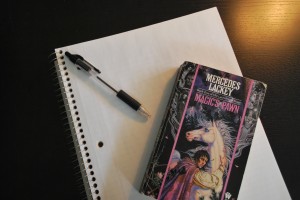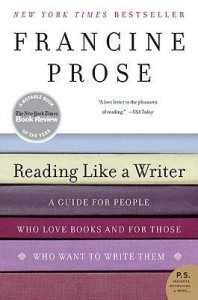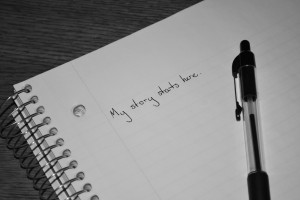 First impressions are everything. At least, that's what everyone says. Now, I don't think that's entirely true. You can recover from a bad first impression...eventually. But I can't deny they're important. Which makes the first line of a novel equally important. Let's say the first page of a book is like a job interview and the reader is the boss. They're saying, “All right, here's your chance. So, entertain me.” That means your first line is like your suit and your smile. Important, right?
In The Breakout Novelist by Donald Maass (intense book, I'm sure I'll talk about it at some point) he has an exercise for first lines. He says “Try this at your next critique group session or chapter meeting of your writer's organization: Ask everyone to bring in two opening lines: their favorite of all time, and the first line from their current manuscript. Mix them up in a hat. Read them aloud and ask people to raise their hands if they want to hear the next line. I promise you, you will see the intrigue factor at work again and again – or not!” See, didn't I say it was a good idea to learn from the masters?
First impressions are everything. At least, that's what everyone says. Now, I don't think that's entirely true. You can recover from a bad first impression...eventually. But I can't deny they're important. Which makes the first line of a novel equally important. Let's say the first page of a book is like a job interview and the reader is the boss. They're saying, “All right, here's your chance. So, entertain me.” That means your first line is like your suit and your smile. Important, right?
In The Breakout Novelist by Donald Maass (intense book, I'm sure I'll talk about it at some point) he has an exercise for first lines. He says “Try this at your next critique group session or chapter meeting of your writer's organization: Ask everyone to bring in two opening lines: their favorite of all time, and the first line from their current manuscript. Mix them up in a hat. Read them aloud and ask people to raise their hands if they want to hear the next line. I promise you, you will see the intrigue factor at work again and again – or not!” See, didn't I say it was a good idea to learn from the masters?
Let's do that here. I'm going to take the first lines from some of the books in my library and see what it is that makes me want to go on. Normally, I give authors more than just the first line before I'll put the book down. In fact, I'll usually read the whole thing telling myself it must get better on the next page. That's something I need to work on but not today. Today we're just going to look at the first lines.
“When Mr. Bilbo Baggins of Bag End announced that he would shortly be celebrating his eleventy-first birthday with a party of special magnificence, there was much talk and excitement in Hobbiton.” The Fellowship of the Rings by J.R.R. Tolkein
You know, I respect Tolkein but I don't think this one works. I recognize he wrote in a different time but this doesn't make me want to know more (except maybe how he can be that old, but this is fantasy, the genre is full of ancient wizards and wizened dwarves).
“I'd never given much thought to how I would die – though I'd had reason enough in the last few months – but even if I had, I would not have imagined it like this.” Twilight by Stephenie Meyer
I'll preface this with: I really don't like Twilight. But I thought it deserved a look since it's so popular. I have to admit, it's not a bad first line. Really melodramatic and a little cliché (not to make excuses, but that's setting the tone for the rest of the book), but I definitely have some questions. Why is she dying? What's been happening the last few months? And what kind of person doesn't think about dying, especially if she had “reason enough”? Well, someone who seriously has no imagination.
“When I wake up, the other side of the bed is cold.” The Hunger Games by Suzanne Collins
Another popular one, though it can't be because of its first line. This gives me no sense of the character, and I think waking up in the morning has to be the least interesting way to start a story. Though, I'll admit, once I got past the first couple pages, I couldn't put it down.
“Your grandfather,” said Vanyel's brawny fifteen-year-old cousin Radevel, “was crazy.” Magic's Pawn by Mercedes Lackey
This is one of my favorite books but not one of my favorite first lines. This doesn't tell me anything about the protagonist. I know I'm supposed to be thinking “Why is the grandfather crazy?” but what's actually going through my head is “Why is the grandfather important?”. And the thing is, he's not. We learn pretty soon that he's dead and his craziness only matters right here in the first paragraph. It has nothing to do with the rest of the book. Kind of misleading, if you ask me.
“People...they do the craziest shit.” Nightlife by Rob Thurman
This one just makes me smile. As you read on, you realize this is a perfect introduction to Cal's character. And it raises questions. Who are the people and what are they doing?
“That fool of a fairy Lucinda did not intend to lay a curse on me.” Ella Enchanted by Gail Carson Levine
Oh, so many questions. And what a great intro to Ella's voice.
“I am not as I once was.” The Hundred Thousand Kingdoms by N.K. Jemisin
What a great promise to start a book with. I know right off the bat that this character is going to grow and change and not necessarily in good ways. The tone of the voice is almost one of regret or forgetfulness, but in just a few words it gives us a sense of Yeine's character.
“On my seventh birthday, my father swore, for the first of many times, that I would die face down in a cesspool.” Flesh and Spirit by Carol Berg
This is one of my favorites. How could you not keep reading? The language is beautiful, the sentiment is shocking, and I already have so many questions about the character, I'm not sure which one to pose first. Maybe: What is up with his family? That actually turns out to be one of the most compelling things about the book.
So what I've learned from this exercise is that I expect the first line of a book to give me a glimpse or a sense of who a character is. I expect questions to be raised, otherwise why would I want to go on? And those first words should set the mood or the tone of the entire book. Something I didn't realize before I started was how important the promise of the first line is. In the case of Magic's Pawn, I felt misled. But The Hundred Thousand Kingdoms stayed true to its promise, though not exactly the way I'd imagined. That isn't something you can tell until you've finished the book, but it is definitely something that your readers are going to notice if they go back and read it again. Something we all hope for.
Character, tone, questions, promise. That's a lot to scrunch into one sentence. What do y'all think? Anything you look for in a first line? Did you disagree with any that I talked about? I think these elements are important but writing is still subjective. A line that works for me may not work for you, and vice versa. In the end you need to know what would keep you reading.





